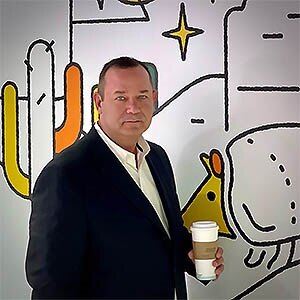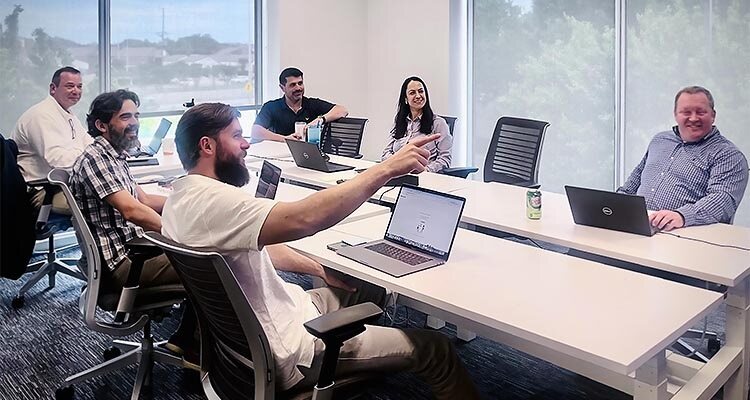Boundary breaking AI communications innovator, RingCentral, strengthens its global supply chain network
Globally integrated internet communications provider, RingCentral, elevates the daily discussions of thousands of businesses across the world. Now a valued partner to major platforms such as Vodafone, HubSpot, Spotify, Reddit, and more, the company began its journey as a humble startup at the dawn of the digital age. “RingCentral was founded as an internet startup in 1999. It’s surprising, looking back, at how long ago it really was. We’re now coming up on our 25th anniversary, and we just hit the ten-year milestone of RingCentral being a publicly traded entity, which makes us positively ancient. We’re very established in the industry at this point,” begins Eric Silver, Vice President of Procurement for RingCentral.
“The business really grew up alongside the internet. We’re operating with our RingEX platform now, but back in the beginning it was AOL, and AIM instant messenger. I had my first email in 1989, and it was ten years between then and the beginning of RingCentral. I had access to the internet earlier than most people, through my work in the military. I went to West Point, and experienced how they used the internet in the early days. My entire career and adult life have been involved with it. I noticed that, especially at the beginning, internal communication inclusion was a bit clunky, to say the least. When you’re operating online, like most businesses do nowadays, that kind of communication is the glue that helps people work together. It’s important.
Strengthening the supply chain
“That’s where RingCentral started. The company began as a voiceover IP operation. From there, it continued to grow and expand. A few years later, we launched our MVP product (now RingEx) alongside our app. If you aren’t familiar with our app, you should be, because it’s amazing. You can get messaging, videophone, collaborative calls, and ties to your Outlook calendar all in one place. We don’t compete with platforms like Teams, we enhance their offering and work alongside them,” he elaborates. Today RingCentral is a leading provider of AI-driven cloud business communications, contact center, video, and hybrid event solutions.
Four years ago, when online communications became a lifeline for businesses the world over, RingCentral played an integral role in keeping people connected. As Eric asserts: “It’s no secret that the world changed in 2020. The pandemic had a huge impact on RingCentral, as suddenly everyone in the world needed to figure out how to work remotely from home. We were able to help lots of businesses with that transition. The most exciting part about working with us at the time would have been developing the tools that helped keep the world going.”
Seeing an increased demand for digital communication tools and AI solutions following the pandemic, the people behind RingCentral decided to expand its

operations. To accommodate such significant growth, the company’s global supply chain network needed to be revolutionized – and that’s where Eric comes in. With a lifetime of experience in communications, sales, procurement, and logistics, he now works to ensure RingCentral has a supply chain fit for the future. “I’ve been with RingCentral for nearly two years, and before that I worked for a large-scale electronics company. I came out of the military with an engineering degree and after my time in the Army I began working in tech sales.
Experience and expertise
“That was probably the best thing that ever happened to me, because once I learned how to approach sales, I realized that procurement was more or less the same thing, you’re just selling internal solutions rather than external ones. A lot of the time, it’s about selling your approach to the supplier. I continued working in sales, moving from business to business, and getting a feel for the industry. I then decided to complete my MBA, which landed me a job at Dell, where I was at the very forefront of their outsourcing operation.
“I became heavily involved in a major project that Dell was undertaking. It was related to their supply chain, and moving through that entire process taught me a lot about how large-scale businesses operate. From there, I moved into program management, specifically large project management strategy relating to operations and procurement. For my last big project with Dell, I was the Agile Team Lead for the company’s indirect procurement organization – I’m proud to say I was able to really take the entire operation to another level.
Manageable growth trajectory
“At that point, I was 18 years into my career and looking for something new and challenging to sink my teeth into. That’s when I learned of an opportunity coming up at RingCentral. I walked in, interviewed, discussed my vision, my focus on people, and my belief in communicating with the partners to fully understand their needs. I pointed out that what works at $200 million doesn’t work at $2 or $5 billion and you must focus on efficiency and scale. All of that resonated with the people at RingCentral. This is a business that has been growing at 28 percent year on year for ten years, they understand the importance of scale.
“The mission had been all about top line revenue growth, until our new Chief Financial Officer stepped in. She recognized immediately that we didn’t just need to be focused on the top line anymore. We needed to start working toward sustainable, profitable growth. Our attitude shifted then. We became more focused on creating a manageable growth trajectory that could be maintained in the long term,” Eric details.
“We’re on the cusp of a massive AI revolution. People are becoming very aware of the fact that we’re living through one of the most decisive times in modern history. Globalization has reached its peak; we’ve largely tapped out and maximized on global markets and offshore operations. Supply chains have become very agile, but in the process, they have also become less sturdy. One error in an international supply chain can cause significant operational delays, so now I’m looking at building resilience into our supply chain. We’ve achieved better outcomes at lower cost. Now, it’s about consolidating that success and fortifying it. Invulnerability: that’s where we’ll be headed in the next five years,” he concludes.
